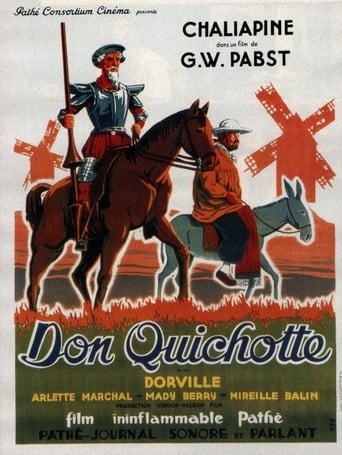

Any excuse to hear Chaliapin sing is worth the listen and the watch. Also, it was great pleasure to see Pabst take on such a task in English. His camera never missed a beat and the scenery was magnificent. There are the things to object about as brought up by sever reviewers. It's true that Chaliapin's English was not good. He probably learned his lines phonetically. I've coached several singers in my time and it does sound like that. The music, by Jacques Ibert. was really quite good throughout and the players around Quixote himself were truly fine. This is a film for the history books - Pabst meets Chaliapin meets Ibert meet Cervantes meet the English language. They all win, but we do have to listen very carefully to the English. It is on the border of comprehension at times.
... View MoreThe French version of this film is available on DVD along with the English version, which is 6 minutes shorter and missing just a few brief scenes and cut differently, with a longer written introduction and conclusion. Chaliapine's French is marginally better than his English and this film gives an astounding impression of his peculiarities as a singing actor: his tendency to interpolate subliminal sighs and groans between notes and his sometimes approximate pitch, which was probably another actor's trick. Besides, he was a "Don Quixote" expert, having created the title role of Massenet's 1910 opera of the same name. These films (the French, English and German versions) were an attempt to capture his legendary stage performance of this character even though the songs are by Jacques Ibert. Ravel had also been asked to compose the songs for the film but he missed the deadline and his songs survive on their own with texts that are different from those found here. The interplay between the French and English versions is fascinating. Some scenes are done exactly the same for better or worse, some use the same footage, re-cut to edit out performance problems, while others have slight variants in staging and dialog. (The English version was doctored by Australian-born scriptwriter and director John Farrow, Mia's father, by the way.) Even though the films are short and they transform, reduce and simplify considerably the original novel, they still manage to carry the themes and the feeling that would make "Man of La Mancha" a hit several decades later and to be evocative of Cervantes' Spain. The ending (which has a jolting special effect I will not reveal) is particularly effective and touching. Both the French and English prints are marred by a few jumps caused by missing frames which unfortunately make those films useless as a perfect recording medium for most of the songs but they are still very watchable and enjoyable. Chaliapine did record his four songs in 1933 for 78 RPM records and they and Sancho's song have been issued on a Marco Polo album (Jacques Ibert Film Music, 8.22387) sung by Henry Kiichli, which uses the published lyrics, which are a little different from the film's lyrics. All performances, except the death scene, appear to have been recorded live. Donnio does his role of Carrasco in both languages and the French Panza Dorville is as spectacular as his English counterpart George Robey is relaxed. All the supporting roles are well played in both versions. I found the English translation of the lyrics intelligent, poetic and perceptive. All in all, a very interesting bilingual package for the discerning opera and film amateur, edited by a video company that specializes in legendary musical performances.
... View MoreMiguel de Cervantes's great novel, "Don Quixote," (Part One, 1605, Part Two, 1615)has been treated in opera, musical comedy, Spanish zarzuela, ballet, film and the fine arts, though it is best played out in the theater of the imagination. To this film can come closest and G. W. Pabst's sensitive treatment in black and white does well indeed. The great Russian bass Feodor Chaliapin, who sang the title role in Jules Massenet's gorgeous 1910 opera, "Don Quichotte," plays Don Quixote, and sings too, with nice music credited to Jacques Ibert. George Robey makes a splendid Sancho Panza. The adaptation is intelligent, with many of the best known episodes treated,if not in the same order as in the book. The film handles well the Duke and Duchess, who humor Don Quixote and Sancho Panza for their amusement, but are somewhat humbled. Having the windmills (Part One, chapter 8) and burning of romances of chivalry at the end (Part One, chapter 6), with the death of Quixote, works surprisingly well. It is worth cleaning up and re-releasing, if possible.
... View MoreI saw the New York Museum of Modern Art's print (the English language version). Only Chaliapin does much singing, but the music and lyrics are not much and I suggest you listen to his recordings to judge his singing. His acting seems very much staged.George Robey is very good as Sancho Panza (Don Quixote's servant), playing him as a Music Hall character. The scene with the traveling players at an inn is also interesting and fun.
... View More